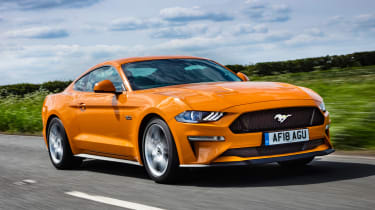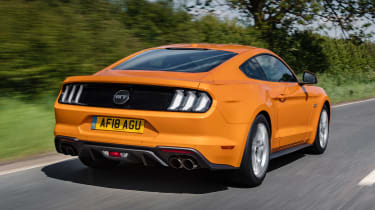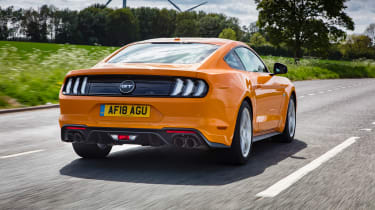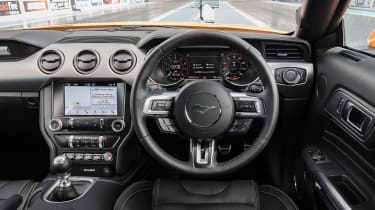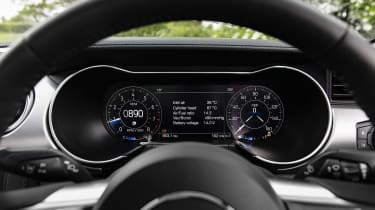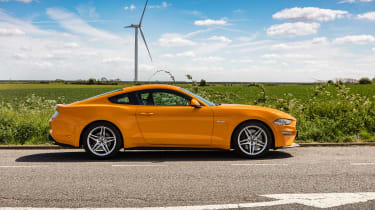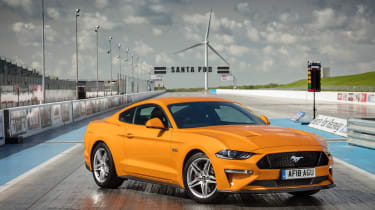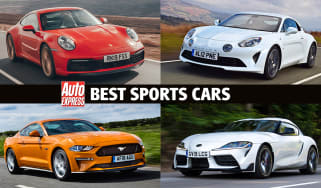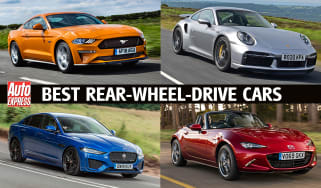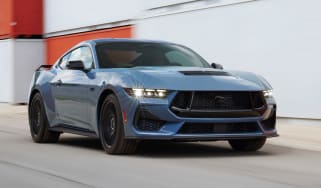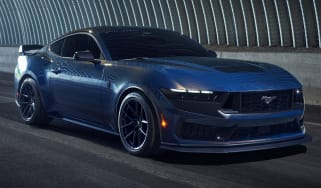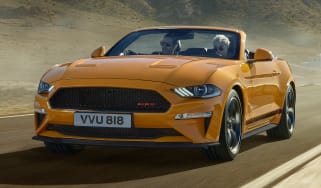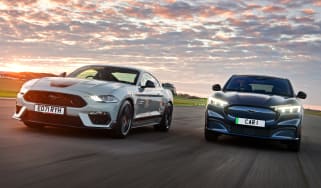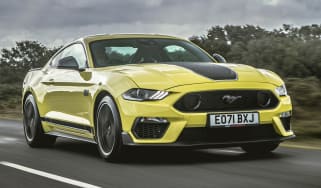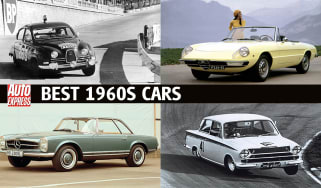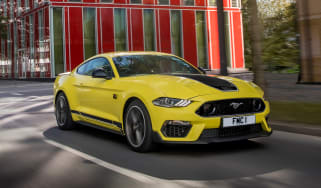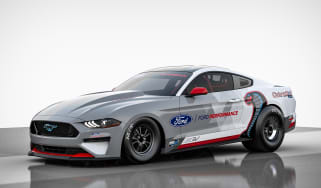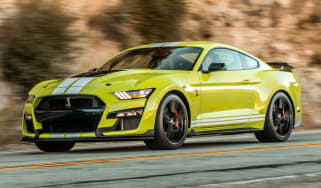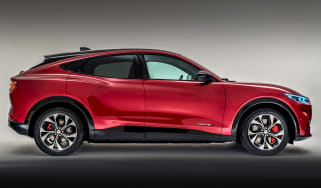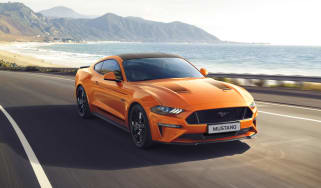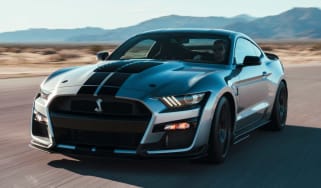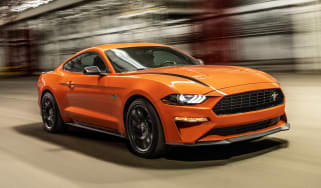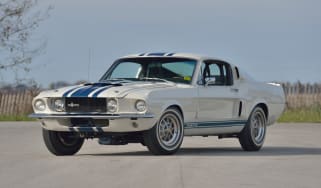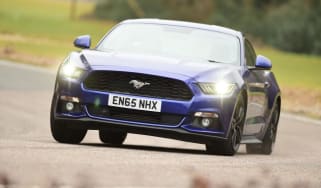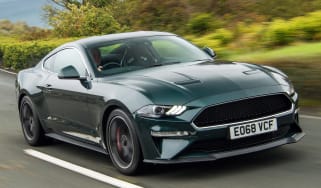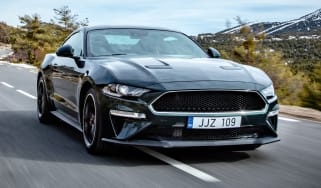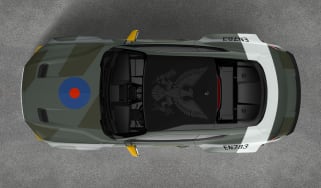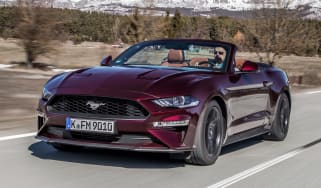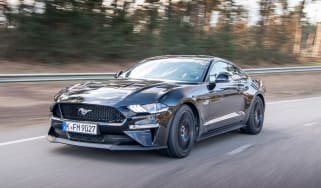Ford Mustang review
The Ford Mustang delivers terrific V8 performance and handling at a price few others can match

PCP finance available
The Ford Mustang is a brilliant sports car, and acts as a flagship for the manufacturer’s entire line-up. It’s one of the most instantly recognisable cars on the road, with sharp lines and retro touches to turn the heads of passers-by. But the Mustang isn’t just for show: the chassis is wonderfully capable and delivers brilliant handling as well as comfy ride quality.
There are some drawbacks of course: some of the interior materials are a little cheap (although an update in 2018 improved this) and the V8 engine is predictably thirsty, but few other vehicles are as eye-catching as the Mustang at this price point, nor can they offer as much engine grunt.
About the Ford Mustang
The Ford Mustang has been on sale in the UK since the latter stages of 2015, although the iconic Mustang name has existed in one form or another since the middle of the 1960s. The current model is the sixth-generation Mustang and continues to be offered as a Fastback coupe or fabric-roofed convertible, with a 5.0-litre V8 petrol engine (the 2.3 Ecoboost is no longer available). This line-up has helped the Mustang to become an instant hit with buyers, while an update in 2018 has helped it to maintain its appeal.
There aren't really many rivals for the Ford Mustang in the UK. Its arch rival in the US is the Chevrolet Camaro, available here as a special order model in left-hand-drive only, so the Mustang has the market pretty much to itself. The Lexus RC F is a V8 coupe, but it's around £20,000 more expensive than the Ford, while the Toyota GR Supra is a better all-round sports car, but is priced to take on pricier rivals like the Porsche Cayman.
The 2.3-litre, four-cylinder Mustang is now off the price list, but a used example would rival the Audi TT and lower-powered versions of the BMW 2 Series. You'll also find the special edition Mustang Bullitt (a dark green V8 model inspired by the Steve McQueen car and movie) on the second-hand market now, although it remains highly regarded by Mustang fans.
More reviews
The 2018 update gave the Mustang a subtly revised look, but there's still no mistaking the Mustang for what it is. There's a good mix of retro design cues and modern lines, and the car's four-seater interior was given a bit of a refresh, too. There was more power for the V8, up from 412bhp to 444bhp, although curiously the EcoBoost model saw a drop in power, from 313bhp to 286bhp.
Ford now offers either the standard V8 Fastback or Convertible models, along with a Mach 1 version that comes with a few extra horses. A 'California Special' convertible variant rounds off the lineup. Buyers have the choice of a six-speed manual or ten-speed auto gearbox across the whole range.
One highlight of the Mustang that makes it more appealing to European tastes is the fact it now comes with independent rear suspension. It replaced the archaic live axle that was fitted in the past, and means the Mustang has good handling that means it's agile and nimble on twisty roads. It also boosts comfort when you're taking it easy.
All Mustangs feature a limited slip differential, selectable driving modes, 19–inch black alloy wheels, Xenon headlamps, Ford's SYNC 3 infotainment system with an eight-inch touchscreen, a nine-speaker stereo with DAB and Bluetooth, plus powered seats, mirrors and windows, a rear view camera, keyless entry and dual zone climate control.
While the UK Mustang range comprises nine models, there are additional options in the US in the form of the powerful Shelby-branded models. These cars boost performance and give them track-focused suspension, tyres and brakes to offer an even sharper drive.
Engines, performance and drive
There’s an assumption that V8-powered American sports cars are fast in a straight line and hopeless in the corners, but the Ford Mustang knocks that theory for six. An archaic live rear axle hamstrung previous generations of Mustang, but Ford has engineered the sixth-generation model with independent suspension at all four corners, and the end result is a car that’s satisfying to drive.
UK manual cars feature four selectable driving modes - Normal, Sport+, Track and Snow/Wet - and these adjust the car’s throttle, steering and stability control settings accordingly. In addition, the steering has three levels of resistance, although feedback is a little vague in all modes. With the 2018 facelift, Ford added a configurable My Mode and a new Drag Strip mode setting for the driving selector.
On the road, the car’s suspension soaks up bumps, although the stiff chassis does tend to follow the contours of the road, but overall it’s a comfortable place to be. In town, the small windows limit visibility, but the controls are light enough that the car is easy to manoeuvre, while a reversing camera is fitted as standard to boost rear visibility.
The optional MagnaRide adaptive dampers available with the facelifted Mustang give greater adjustability and fluidity to the Mustang, with the Convertible benefiting significantly from the advantages these convey.
On fast, twisty roads the Mustang performs admirably. It’s well balanced and changes direction quickly, while body roll is kept in check. Get on the power in corners, and the back end will squirm to get the power down, but switch the traction control off completely and you can provoke the car into slides relatively easily, while a smooth power delivery means it’s easy to control, made easier by the standard limited-slip diff.
On the motorway, long gearing in sixth means the V8 is only turning at 1,800rpm at 70mph, so there’s not much engine noise, although tyre roar is noticeable at speed.
Of course, the rumbling 5.0-litre V8 under the bonnet is a big draw for buyers, and its performance doesn’t disappoint. Peak power of 444bhp is made at the 7,000rpm redline, and you have to wind the engine up through the gears to make progress - if you’re pressing on, you don’t need more than third or fourth for the best response, as fifth and sixth are better suited to cruising.
We tested the original V8 in slippery conditions, which meant we could only record a best 0-60mph time of 5.6 seconds. The rear wheels broke traction easily in first and second gear, but Ford’s claimed 0-62mph time of 4.9 seconds seems achievable if it’s dry. The manual shift is short and precise, while a launch control system optimises the car for perfect standing starts.
Ford also includes an electronic Line Lock, which is a piece of electronic trickery sourced from drag racing. The system fully applies the front brakes while allowing the rear tyres to spin up under power, letting you achieve smoky burnouts. The system shuts off after 15 seconds, although that’s still long enough for you to wear out a pair of rear tyres faster than you would in normal use.
Elsewhere, the GT gets six-piston Brembo brakes, and while pedal response is rather sharp, there’s strong power to get the car to a halt quickly. That said, the EcoBoost's standard discs and calipers do a decent job of slowing the hefty Mustang to a halt.
While the 10-speed automatic gearbox of the facelifted Mustang is better than the six-speed unit it replaces, the manual transmission is still the box to go for. As a traditional torque converter unit, the new auto doesn't have the immediacy offered by a dual-clutch setup, with downshifts in particular lacking the urgency one might expect.
0-62mph acceleration and top speed
The 5.0-litre V8 is the flagship of the range, and it makes 444bhp at 7,000rpm, so you need to rev it to make the most of its performance. There’s also 533Nm of torque on offer, and the broad spread of power means it’s possible to trundle along at 30mph in sixth gear with the engine turning at 750rpm without any trouble. The Mach 1 Fastback and Convertible versions feature a slight increase in power, although torque is fractionally down. The hard-top variant is the quickest from 0-62mph, however, taking just 4.4 seconds.
The 286bhp 2.3-litre turbo EcoBoost engine is punchy, even if it’s not as fast as the V8. Some buyers might appreciate the extra economy you get without sacrificing too much performance, though. The EcoBoost feels a little lethargic off the line as it struggle to overcome the Mustang's near 1,700kg kerbweight, but once the turbo is pumping at around 2,000rpm, it feels nearly as quick as the V8 car. It's just a shame it doesn't sound as good.
Like the latest generation of BMW M cars, the Mustang gets a sound symposer that uses the stereo to deliver a more sporty soundtrack. The resulting growl certainly sounds racier than the four-cylinder unit’s natural drone, but there's no escaping the fact that it's a synthesized engine note.
Most UK buyers are going for the V8 model, attracted not only by its performance, but also its V8 rumble. It sounds good, although it’s not as loud as a Jaguar F-Type, for example.
MPG, CO2 and running costs
The facelifted Mustang range is still good value when compared to rivals. The 5.0 GT is the cheapest V8 car on sale in the UK, and by some margin, but it’s also well equipped, with leather, climate control, a limited-slip diff, xenon lights and DAB radio all included. The only options are an upgraded infotainment system with sat-nav, heated and cooled seats, rear parking sensors, and a choice of three Custom Packs ranging from around £1,600 to £2,500.
If you want a different V8 coupe, then take a look at the Lexus RC F, although it’s arguable that the Mustang is more enjoyable to drive. In contrast, the (now discontinued) 2.3 EcoBoost model is priced to match models such as the Audi TT 2.0 TFSI Sport, although the Ford is bigger than just about every other car in this class.
The big blot on the Mustang’s copybook is the expense of running a 5.0-litre V8. There’s no stop-start eco system, so expect economy of around 22-25mpg, unless of course you choose to exploit the Mustang's power on a more regular basis - in which case you'll be well down into the teens. CO2 emissions don't make for great reading, either, starting from 256g/km.
An EcoBoost model is better, with claimed economy of 31.3mpg and emissions of 204g/km for the coupe and 209g/km for the convertible, but that’s still behind the Audi TT and BMW 2 Series. Add an auto box to either the V8 or the EcoBoost and emissions are made worse on the latter, but the V8 is slightly better - although that doesn’t improve road tax or company car costs. You get a 61-litre fuel tank in the Mustang, which means you’ll get a range of around 270 miles in the V8 model.
Insurance groups
The Mustang sits in insurance groups 41-46, which is on the high side, but then if you’re happy to stump up the fuel and tax costs, then it probably won’t be too much of a concern. The V8 has the same Group 43 rating as the EcoBoost Convertible, which is lower than for rival V8 models.
One useful feature is Ford’s MyKey function, which allows you to set controls and functions to limit who can use the car, including setting a speed limiter.
Depreciation
Our experts predict impressive residuals of between 60-63 per cent for the Mustang Fastback after a typical three-year/36,000-mile ownership period, while the Convertible model is just behind on 59-60 per cent.
Interior, design and technology
American cars have a reputation for being big and bold, and the Mustang doesn’t disappoint. The four-seater coupé is nearly as long as a Mondeo, but the low roof and wide track provide a sporty look.
It’s an evolution of the last model, yet while there are retro cues to the design, it still looks modern. Up front is a large grille with a galloping horse logo in the middle, while the small light housings either side emphasise the imposing front end.
A pair of sculpted lines rise from the long bonnet, and the blistered wheelarches add to the muscular look. There’s a low roof and small glass area, while the Fastback rear barely deviates from horizontal.
The tail-lights are set into a black panel with a big GT badge in the middle – a nod to the sixties Mustang – but lower down the body-coloured section in the rear diffuser is similar to the Fiesta ST���s. The V8 gets black 19-inch multi-spoke alloy wheels as standard, while going for one of the Custom Packs means you can add silver wheels in the same design, plus silver trim for the windows. A variety of striking paint colours are available at extra cost, while everywhere we you go, the Ford will turn heads, with its kerb appeal certainly matching a Jaguar F-Type.
Climb inside, and there are more retro touches. The three-spoke steering wheel has a silver finish and a chrome-ringed Mustang logo, although the multitude of buttons on the wheel adds a hint of modernity to it. A swathe of silver plastic covers the dash, and there’s a ‘Since 1964’ plaque on the passenger’s side of the upright dash, while the rotary volume and tuner controls create a nostalgic feel.
The rocker switches for the temperature controls are a bit fiddly to use, while the bank of toggle switches beneath the climate buttons are another nod to the sixties car, although again the big, red-ringed starter button adds a modern touch to the controls. Ahead of the driver there’s a pair of deep cowled instruments – the speedo has the legend ‘Ground Speed’ emblazoned upon it – and between them is a full colour trip computer display that shows a comprehensive amount of information.
Unfortunately, it’s the interior that gives away the Mustang’s budget roots, and some of the cabin plastics feel cheap. The silver trim on the dash looks a bit low-rent, while hard plastics are used for the glovebox, centre console, door trims and the overhead light switches.
Interior quality took a step up when the 2018 facelift arrived, though, partly thanks to the addition of some new soft-touch interior plastics. The analogue dashboard dials were also replaced, with a 12-inch digital screen standing in their place as standard.
And whatever your thoughts are on the facelift's aesthetic changes, the new lights, bumpers, wheels and exhausts, plus the lower bonnet and sharper grille, give the 2018 car a look that's clearly different from the model it replaces.
Sat-nav, stereo and infotainment
The Mustang comes with Ford’s latest infotainment system, which, in facelifted cars, means you get its eight-inch Sync 3 system, a;lthough sat-nav comes as part of the optional Custom Pack 2.
New for the 2018 facelift is a standard 12-inch digital dashboard. While some might miss traditional 'clocks', the digital dash looks great, and changes its display based on the selected driving mode.
Bluetooth, DAB radio and a USB socket are all standard, and so is Ford’s advanced Sync voice control system. This allows you to make hands-free adjustments to the radio, phone and climate controls by pressing a button on the steering wheel to speak your instructions.
Pairing a phone to make calls and stream audio is a straightforward process, and you can set one phone as your favourite to automatically connect every time you get on board.
The optional Shaker sound system adds a subwoofer that’s set into the side of the boot behind the offside rear wheel. It doesn’t really reduce boot space, and adds some extra bass to the sound system, for those times when you’re bored of listening to the Mustang’s V8. Although if you get tired of that, then you have no soul and this isn’t the car for you.
Practicality, comfort and boot space
The Mustang is reasonably practical for a sports car. It’s a long car, but that means there’s room for a pair of back seats and a reasonably sized boot. There’s more space than you’ll find in an Audi TT, although access to the boot is a bit trickier thanks to the narrow opening of the saloon-style bootlid.
Size
At 4.8 metres long, the Mustang is nearly the same length as the five-door Ford Mondeo (4.87 metres), but it’s not as wide and a lot lower. Compared to rivals such as the BMW 2 Series and Audi TT, the Mustang is a fair bit larger, but that does mean there’s more space inside.
The suspension has been set up to deliver a good mix between handling and comfort, and unlike some rivals, the ride height is set so that the car doesn’t scrape over speed bumps.
Leg room, head room & passenger space
Up front, access is easy thanks to the wide opening doors. At night, Mustang logos are projected on the floor by the puddle lights in the wing mirrors. There’s plenty of space inside and no issues with head or legroom, while a wide range of wheel and seat adjustment means it’s easy to get comfortable at the wheel. Forward visibility is compromised slightly by the long, bulging bonnet – it would be nice if Ford offered front parking sensors, but they aren’t available. The thick rear pillars and narrow rear glass limit the rear view, but a standard-fit reversing camera is a helpful addition.
There isn’t much leg or headroom in the back seats, so they’re only really suitable for small children. However, there is more space in the back than you’ll find in similarly sized coupes, like the Nissan GT-R. The back seats feature Isofix child seat mounts, but adding a child seat is tricky because access to the back seats is tight behind the folded front seats. And if you have fitted a child seat, legroom is reduced even further.
Boot
The back seats fold 50:50 to improve boot space, which measures 408 litres in regular use. A high load lip and narrow opening thanks to the saloon-style bootlid make access to the boot tricky, but you can fit in a couple of medium sized suitcases pretty easily. There are no lashing eyes, but there is additional storage under the boot floor in the spare wheel well around the standard tyre repair kit.
The boot can be opened via a button above the number plate, with two presses of the key fob, or via a flimsy button on the dashboard.
Cabin storage is reasonable for a sports car. The door bins are pretty good, and there’s a decent-sized glovebox, while the small armrest cubby is supplemented by a pair of deep cup-holders, although even a canned drink can get in the way as you reach for the gearlever.
Reliability and Safety
Ford has fitted a raft of electronic driver aids to keep the Mustang on the straight and narrow. There’s a multi-stage traction control system with different settings for road or track use, while the V8 GT model gets six-piston Brembo brakes for improved stopping power.
All models get a full set of airbags, while a pedestrian-friendly pop-up bonnet boosts safety. The back seats come with Isofix mounts for child seats, too. In January 2017, the Ford Mustang hit the headlines for all the wrong reasons, when it was awarded a lowly two stars in the Euro NCAP crash safety test. While the Mustang gets a 72 per cent rating for adult occupant protection, the cause for concern regards protection for child occupants and the lack of the safety equipment.
Later in the year, the facelifted Mustang was re-tested in a bid to improve its score. Changes to the frontal airbags and the addition of autonomous emergency braking and lane assistance as standard delivers a three-star rating.
In terms of build quality, the Mustang feels well built, even if the materials used aren’t of the highest quality. And, while it sells in too few numbers to have featured in our 2022 Driver Power Customer satisfaction survey, Ford as a company finished in 25th position out of 29 manufacturers.
Warranty
Like every new Ford, the Mustang comes with a three-year, 60,000-mile warranty, which is backed up by one-year’s breakdown assistance. That’s fairly average, and no better or worse than rivals which offer similar coverage.
Servicing
Ford has yet to confirm servicing costs for the Mustang, but you can expect them to be cheaper than they are for premium rivals. Add in Ford’s vast dealer network, and it should be pretty easy to get the car maintained on schedule. Service intervals are every 12 months or 10,000 miles, which is a shorter distance between dealer visits than it is for some rivals.
For an alternative review of the latest Ford Mustang, visit our sister site carbuyer.co.uk...

